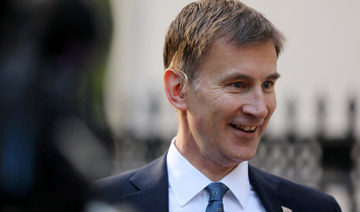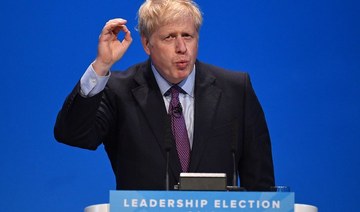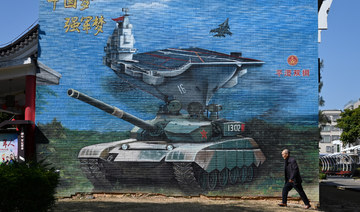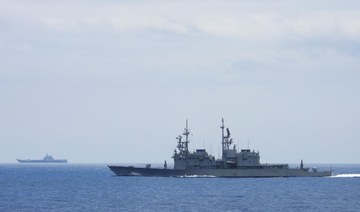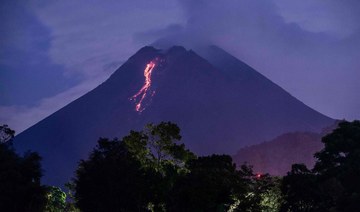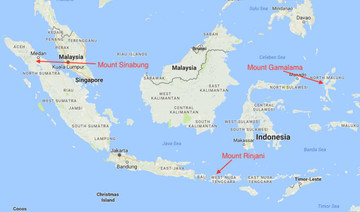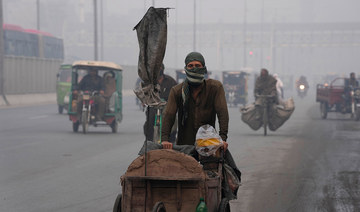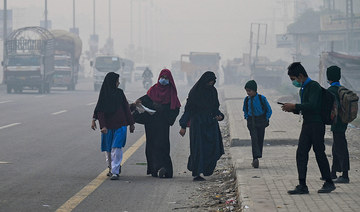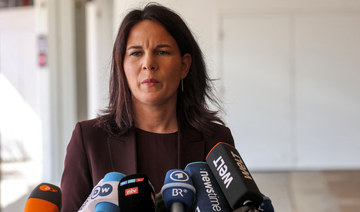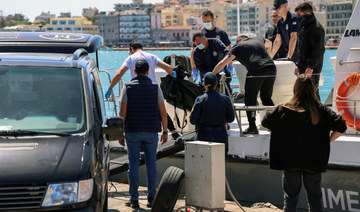LONDON: Britain is getting a new prime minister. Buckle up for a rocky ride.
On Tuesday, the UK’s governing Conservatives will announce the winner of a contest to replace Theresa May as leader of the party and the country. Just over three months later, on Oct. 31, Britain is scheduled to leave the European Union.
With the new British leader on a collision course with both the EU and Britain’s Parliament over Brexit, the UK could be heading for a political crisis, a recession, an election, a referendum — or several of those options at the same time.
“It’s a very fluid situation, said Nick Wright, an expert on EU politics at University College London. “Literally, anything could happen.”
Enter Boris
Barring a major upset, Britain’s next prime minister will be Boris Johnson. The buoyant former foreign secretary is so far ahead with bookies and pollsters that it will be a huge shock if rival Jeremy Hunt is declared the victor on Tuesday.
Johnson, who sometimes has an ambiguous relationship with facts, campaigned with characteristic bluster, vowing to revive the country’s “mojo” and making one main promise: Britain will leave the EU on Oct. 31, “come what may.”
He may find that promise hard to keep. The new leader heads a government with no parliamentary majority in a deeply divided country that is facing off with a mistrustful EU.
Immediate challenge
The prime minister is due to take office Wednesday in a smoothly choreographed political handover. May will travel to Buckingham Palace and ask Queen Elizabeth II to invite her Conservative successor to form a government. Johnson — or, less likely, Hunt — will speak to the nation in front of his new home at 10 Downing St. that afternoon.
The new leader could face a challenge before he’s even had a chance to unpack. The opposition Labour Party is considering calling a no-confidence vote in the Conservative government on Thursday. It would only take a handful of Conservative rebels to defeat the government and — unless it can overturn that vote within 14 days — trigger an early election.
The good news for the prime minister is that Parliament is due to start its six-week summer break on Friday and Labour will probably decide to wait until the fall before making a move.
Make me an offer
Both Johnson and Hunt say they will immediately start talks with the EU about changing the Brexit withdrawal agreement agreed upon by May’s government, a pact that has been rejected three times by Britain’s Parliament.
Yet Britain may struggle to get the bloc’s full attention during August, a sleepy holiday period in much of Europe. And in any case, EU leaders have insisted they won’t renegotiate. They also have a special distrust for Johnson, who began his career as a Brussels-based journalist spinning exaggerated stories of outrageous EU red tape for a British newspaper.
Johnson, like Hunt, says the key to winning Parliament’s backing for a Brexit deal is to ditch the “backstop,” an insurance policy designed to guarantee that the UK’s only land border with the EU — between Northern Ireland and Ireland — remains free of customs posts and other obstacles.
The EU, however, is adamant that without the backstop there can be no deal.
“Part of me thinks that Prime Minister Boris Johnson thinks he can just get away with it through sheer force of personality,” Wright said. “But I don’t see why the EU would make compromises to him that they wouldn’t make to Theresa May.”
Destination no deal
The new leader’s EU negotiations will go hand-in-hand with intensified British planning for a no-deal exit: bolstering border staff, working with businesses and reassuring the public. Johnson claims that if Britain prepares properly, a no-deal Brexit will be “vanishingly inexpensive.”
Experts disagree. The government’s Office for Budget Responsibility said last week that crashing out of the bloc would shrink the British economy by 2% within a year, drive down the pound currency and plunge Britain into a prolonged recession.
Leaving without a deal would mean tariffs and customs checks for goods traveling between Britain and the EU, and would rip up thousands of rules governing everything from trade to aviation to telecommunications.
The House of Commons Exiting the European Union Committee says a no-deal Brexit “could lead to severe disruption of the economy, pose a fundamental risk to the competitiveness of key sectors of the UK economy and put many jobs and livelihoods at risk.”
Halloween showdown
While some British lawmakers think the dire warnings are exaggerated, a majority is determined to halt a no-deal Brexit. In a pre-emptive strike, lawmakers last week passed a measure that prevents the new prime minister from suspending Parliament in the fall — something Johnson has suggested he could do if legislators try to stop Brexit.
But halting a prime minister who is determined to press for a no-deal Brexit could be hard. By law, Britain will cease to be a member of the EU on Oct. 31, with or without a deal, unless Britain revokes its decision or the EU grants a delay.
Brexit Secretary Stephen Barclay said last week that the chances of a no-deal Brexit have been “underpriced.”
“I think it’s the will of many members of Parliament for there to be a deal. But the question then will be ‘is there a deal that is palatable to Parliament?’” he told Parliament’s Leaving the European Union Committee. “And if not, will Parliament vote to revoke or will we leave with no deal?”
Unpredictable outcome
The crisis could come to a head at an EU summit on Oct. 17, just two weeks before Brexit day. EU leaders are sick of the Brexit soap opera, and could resist if Britain asks for a further delay. Newly elected European Commission President Ursula von der Leyen says Britain can have an extension if it’s for a strong reason such as an election or a new referendum.
Britain is not scheduled to have an election until 2022, but could hold an early poll if the government loses a no-confidence vote, or if the prime minister calls one to seek a mandate for his version of Brexit.
An election might shake up Parliament and break the Brexit deadlock, but could also result in yet another divided legislature. Another potential deadlock-breaker, a new referendum on Britain’s EU membership, could settle the issue, or prove as divisive as the last.
Once Britain does leave the bloc, its leader faces a fresh set of challenges in negotiating new trade deals around the world. The most coveted deal is with the United States, but “America First” President Donald Trump is guaranteed to drive a hard bargain.
A visit to Washington will be high on the new prime minister’s agenda. Trump has warmly praised Johnson, but he can be a fickle friend.
Inconsistency of speech is something he and Johnson have in common.
Johnson may be hoping no one reminds Trump that in 2015 he accused him of “stupefying ignorance” and said Trump was “unfit to hold the office of president of the United States.”
Last month, Johnson said the American president had “many good qualities.”
With Boris Johnson tipped to win PM race, UK eyes rocky ride
With Boris Johnson tipped to win PM race, UK eyes rocky ride

- With the new British leader on a collision course with both the EU and Britain’s Parliament over Brexit, the UK could be heading for a political crisis, a recession, an election, a referendum
- Johnson may be hoping no one reminds Trump that in 2015 he accused him of “stupefying ignorance”
Fighting flares at Myanmar-Thai border as rebels target stranded junta troops
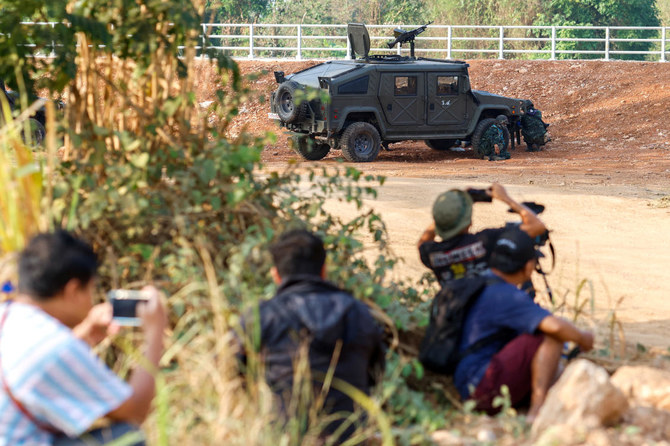
- Resistance fighters and ethnic minority rebels seized the key trading town of Myawaddy on the Myanmar side of the frontier on April 11
Resistance fighters and ethnic minority rebels seized the key trading town of Myawaddy on the Myanmar side of the frontier on April 11, dealing a big blow to a well-equipped military that is struggling to govern and is now facing a critical test of its battlefield credibility.
Three witnesses on the Thai and Myanmar sides of the border said they heard explosions and heavy machine gun fire near a strategic bridge from late on Friday that continued into early Saturday.
Several Thai media outlets said about 200 people had crossed the border to seek temporary refuge in Thailand.
Thai broadcaster NBT in a post on social media platform X said resistance forces used 40-milimeter machine guns and dropped 20 bombs from drones to target an estimated 200 junta soldiers who had retreated from a coordinated rebel assault on Myawaddy and army posts since April 5.
Reuters could not immediately verify the reports and a Myanmar junta spokesperson could not immediately be reached for comment.
Thai Prime Minister Srettha Thavisin said he was closely monitoring the unrest and his country was ready to provide humanitarian assistance if necessary.
“I do not desire to see any such clashes have any impact on the territorial integrity of Thailand and we are ready to protect our borders and the safety of our people,” he said on X. He made no mention of refugees.
BIG SETBACK
Myanmar’s military is facing its biggest challenge since first taking control of the former British colony in 1962, caught up in multiple, low-intensity conflicts and grappling to stabilize an economy that has crumbled since a 2021 coup against Nobel laureate Aung San Suu Kyi’s government.
The country is locked in a civil war between the military on one side and, on the other, a loose alliance of established ethnic minority armies and a resistance movement born out of the junta’s bloody crackdown on anti-coup protests.
The capture of Myawaddy and surrounding army outposts is a significant setback for a junta that has been squeezed by Western sanctions, with the town a key tax revenue source and conduit for more than $1 billion of annual border trade.
The Khaosod newspaper in a post on X showed a video of Myanmar civilians, many of them women and children, being marshalled by Thai soldiers at an entry point to Thailand.
Thailand had on Friday said no refugees had entered the country and it was discussing with aid agencies about increasing humanitarian relief to civilians on the Myanmar side.
Taiwan’s defense ministry detects 21 Chinese military aircraft

- The median line bisects the Taiwan Strait, a narrow 180-kilometer waterway separating the island from mainland China
TAIPEI: Taipei’s defense ministry said it had detected 21 Chinese military aircraft around the self-ruled island since 8:15 am (0015 GMT) on Saturday, a month before Taiwan’s May 20 inauguration of incoming president Lai Ching-te.
“17 aircraft (of the 21) crossed the median line and its extension, entered our northern, central, and southwestern (air defense identification zone), and joined PLA vessels for joint combat patrol,” it said in a statement posted on X around 11:30 am.
Taiwan’s armed forces “are monitoring the activities with our joint surveillance systems, and have dispatched appropriate assets to respond accordingly.”
The median line bisects the Taiwan Strait, a narrow 180-kilometer waterway separating the island from mainland China.
Beijing does not recognize the line as it claims democratic Taiwan as part of its territory. It has also never renounced the use of force to bring the island under its control.
China sends warplanes and naval vessels around Taiwan on a near daily basis — a move experts say is a form of “grey-zone harassment,” stopping short of an outright act of war but enough to exhaust Taipei’s armed forces.
According to the defense ministry, the 21 aerial objects detected Saturday included J-16 fighter jets and Y-8 medium-range transport aircraft, as well as drones.
The highest number around Taiwan so far this year was in March, when the ministry said 36 Chinese aircraft were detected in a single 24-hour period.
Last year’s record was in September when Beijing’s military sent 103 aircraft — 40 of which crossed the median line — in a 24-hour period.
Saturday’s show of force comes a day after China activated two aviation routes that run close to Taiwan’s outlying islands of Kinmen and Matsu.
Taipei’s Civil Aviation Administration expressed “solemn protest against China’s unilateral measures without consultation” on Friday.
The new routes make the airspace separation between the two sides “very narrow,” it said, increasing flight safety risks during bad weather or abnormal flight operations.
China’s aviation authority also said Friday the airspace around Fuzhou Changle Airport — 30 kilometers from the closest outlying Taiwanese island — would be “further optimized and adjusted” on May 16, four days before the inauguration.
Under the administration of Taiwanese President Tsai Ing-wen, tensions between Beijing and Taipei have ramped up, as she and her government do not acknowledge China’s claim.
Her deputy, Vice President Lai, won elections in January despite warnings from Beijing that he would be the cause of “war and decline” for Taiwan.
China regards Lai — who used to be outspoken about Taiwan independence — as a “dangerous separatist,” though he has moderated his views in recent years.
Hundreds of people evacuated as volcano spews clouds of ash in Indonesia
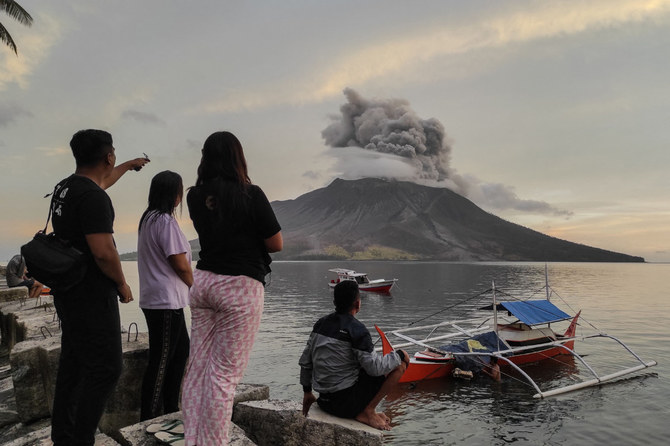
- Local authorities combed the villages surrounding the volcano and evacuated residents to safer areas by boat
- Officials worry that part of the volcano could collapse into the sea and cause a tsunami, as happened in an eruption there in 1871
MANADO, Indonesia: More than 2,100 people living near an erupting volcano on Indonesia’s Sulawesi Island were evacuated Friday due to the dangers of spreading ash, falling rocks, hot volcanic clouds and the possibility of a tsunami.
Indonesia’s Center for Volcanology and Geological Hazard Mitigation recorded at least three eruptions since Friday afternoon, with the maximum height of the eruption column reaching 1,200 meters (3,900 feet).
An international airport in Manado city, less than 100 kilometers (60 miles) from the erupting Mount Ruang, is still temporarily closed as volcanic ash was spewed into the air.
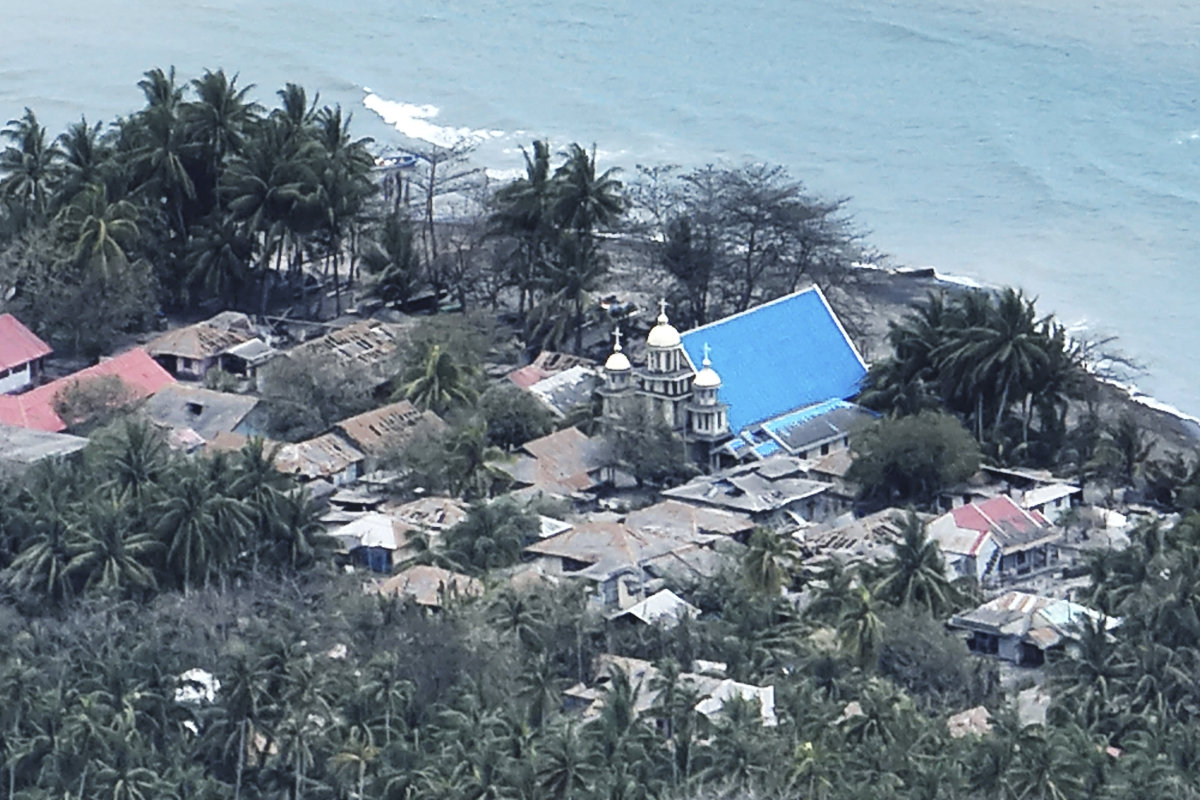
Satellite imagery from the Meteorology, Climatology and Geophysics Agency shows the ash has spread to the west, northwest, northeast and southeast, covering Manado and North Minahasa, according to a statement from Indonesia’s Transportation Ministry.
“We are still monitoring developments in the eruption of Mount Ruang and coordinating with relevant stakeholders … to anticipate the necessary actions to ensure flight safety, security and comfort,” said Ambar Suryoko, head of the regional airport authority.
More than 11,000 people were told to leave their homes that were located in the affected area. A joint team from the local authorities combed the villages surrounding the volcano and evacuated residents to safer areas by boat.
Officials worry that part of the volcano could collapse into the sea and cause a tsunami, as happened in an eruption there in 1871.
Houses, roads and other buildings were covered by gray volcanic ash, and many roofs were broken by debris spewed from the eruption.

Mount Ruang saw at least five large eruptions Wednesday, causing the Center for Volcanology and Geological Hazard Mitigation to issue its highest level of alert. People were ordered to stay at least 6 kilometers (3.7 miles) from the 725-meter (2,378-foot) mountain.
The observation from the agency on Friday said white smoke was rising from the main crater with medium to thick intensity.
East of the volcano, Tagulandang Island could be at risk if a collapse occurred. Its residents were among those being told to evacuate. Indonesia’s National Disaster Mitigation Agency said residents would be relocated to Manado, a journey of 6 hours by boat.
Indonesia, an archipelago of 270 million people, has 120 active volcanoes. It is prone to volcanic activity because it sits along the “Ring of Fire,” a horseshoe-shaped series of seismic fault lines around the Pacific Ocean.
Finance firms urge ambitious action on plastic pollution

- Curtailing the estimated 400 million metric tonnes of waste produced every year is a crucial part of efforts to protect biodiversity, with microplastics found everywhere from the mountainous Himalayas to staple foods and even human blood
LONDON: A group of 160 financial companies on Friday urged governments to agree a treaty to end plastic pollution that would help spur private sector action, ahead of the next round of global talks in Canada.
The fourth meeting of the Intergovernmental Negotiating Committee on Plastic Pollution (INC-4) is due to be held in Ottawa next week to lay the groundwork for an eventual deal before the end of the year.
Curtailing the estimated 400 million metric tonnes of waste produced every year is a crucial part of efforts to protect biodiversity, with microplastics found everywhere from the mountainous Himalayas to staple foods and even human blood.
To help fix the problem, the finance firms, which include Britain’s biggest investor Legal & General Investment Management and Canadian pension investor CDPQ, called for a policy framework backed up by binding rules.
Among specific steps, the group called for the treaty to set an objective for all public and private finance to be consistent with the goal of eliminating plastic pollution, similar to that in the Paris climate agreement and the Kunming-Montreal global biodiversity framework.
It also called for companies to assess and disclose plastic-related risks and opportunities; clearer plastic-related policies and targets from governments in areas like waste creating and recycling; and for further private investment to be directed to ending plastic pollution.
“A clear transition pathway laid out in the Treaty will help leverage finance at scale for this massive task of ending plastic pollution worldwide,” said Anne-Sophie Castelnau, global head of sustainability at ING, one of the signatories.
Steve Hardman, CEO of Plastic Collective, an NGO which designed the world’s first plastic waste reduction bond alongside Citi and the World Bank, welcomed the support but called for business to provide more financial solutions.
In January, the World Bank issued the $100 million bond to finance plastic-reduction projects in Ghana and Indonesia. Investors will be paid a rate linked to plastic removal credits generated by the projects.
Finnish PM: EU should help end migrant influx from Russia

- European Commission President Ursula von der Leyen visits the border to assess security situation
HELSINKI: The EU should take measures to help Finland stop an influx of migrants via Russia, Finnish Prime Minister Petteri Orpo said.
Finland last year shut its long border with Russia amid a growing number of arrivals from countries including Syria and Somalia.
It accused Moscow of weaponizing migration against the Nordic nation and the EU, an assertion the Kremlin denies.
Finland’s government has closed eight of its nine checkpoints with Russia.
The only one that remains open is dedicated to rail travel and cargo trains mainly run through it.
“We are preparing our legislation, but we also need EU measures,” Orpo said, without elaborating, after visiting the Nordic country’s border with European Commission President Ursula von der Leyen.
Von der Leyen told the same press conference that the EU Commission was working closely with the migrants’ countries of origin, agreeing with Finland’s position.
“What we see is that a state is instrumentalizing poor people to put pressure on another state, so that is a clear security issue,” she said.
She said that the measures taken to deal with migrants from Russia must balance protecting the security of borders and international obligations.
Following Poland and Lithuania’s example on their borders with Belarus, the Finnish government is drafting legislation allowing border guards to block asylum seekers entering the country from Russia.
“We all know how (Russian President Vladimir) Putin and his allies instrumentalize migrants to test our defenses and to try to destabilize us,” von der Leyen told officials.
“Now Putin is focusing on Finland, and this is no doubt in response to your firm support of Ukraine and your accession to NATO.”
Von der Leyen and Orpo flew in a Finnish helicopter over the landscape of forests and towns on the border.
Von der Leyen is campaigning as a conservative European People’s Party bloc member for a second term in office as head of the EU’s powerful executive branch.
Security is a top EPP theme before the June 6-9 European Parliament elections.
Most of the migrants hail from the Middle East and Africa.
Most of them have sought asylum in Finland, a member of the EU and NATO with a population of 5.6 million.
Finland joined NATO in April 2023, ending decades of neutrality after the country’s defeat by the Soviet Union in the Second World War.
In March, Sweden also became a member of the trans-Atlantic alliance.
The move dealt a major blow to Putin, with a historic realignment of Europe’s post-Cold War security landscape triggered by Moscow’s offensive against Ukraine.



